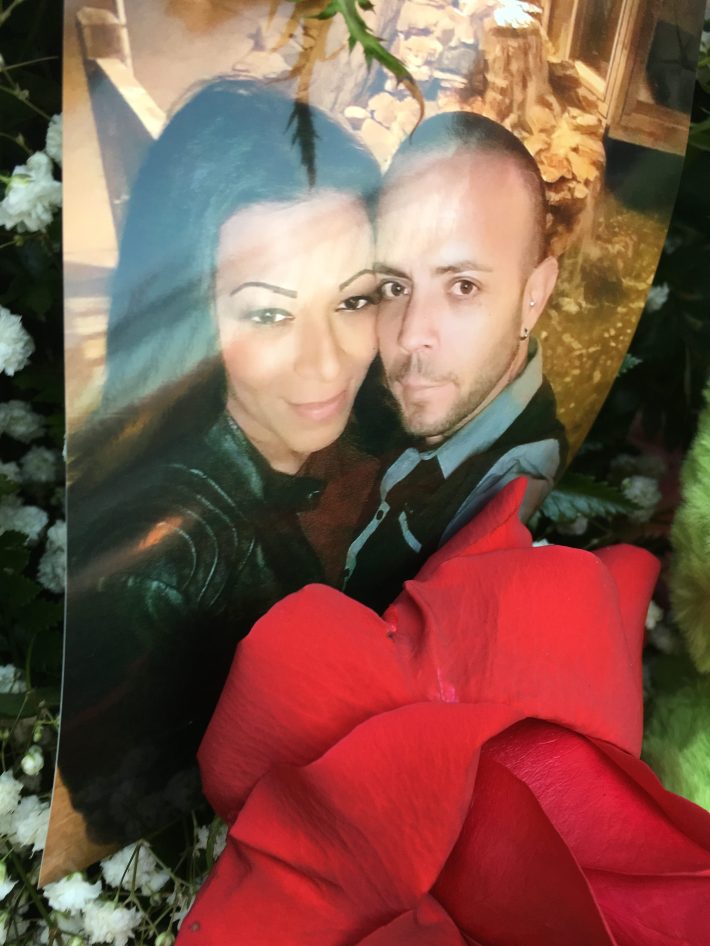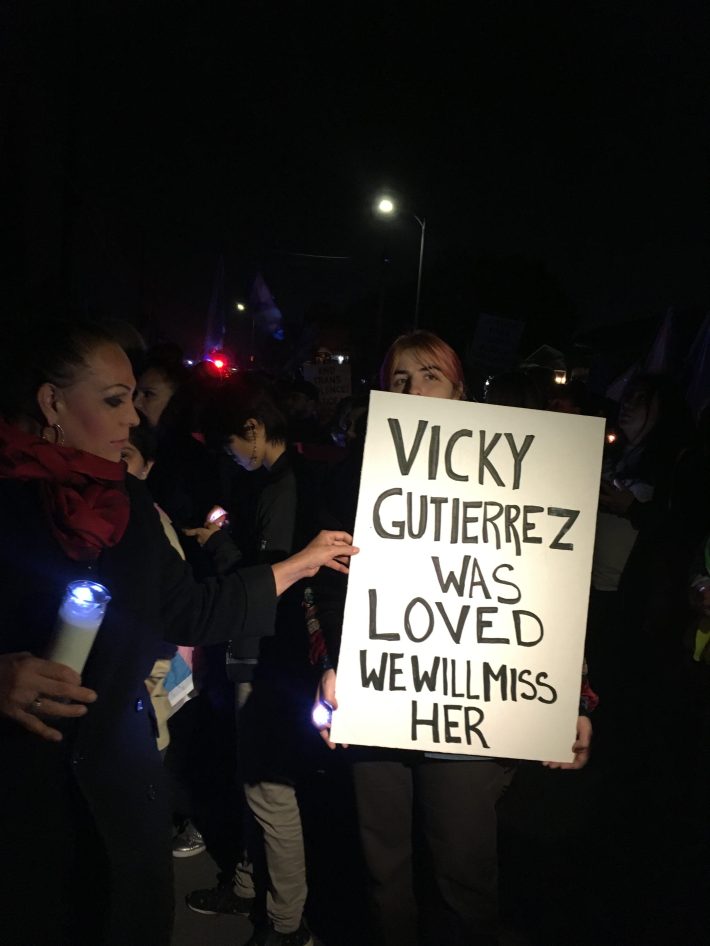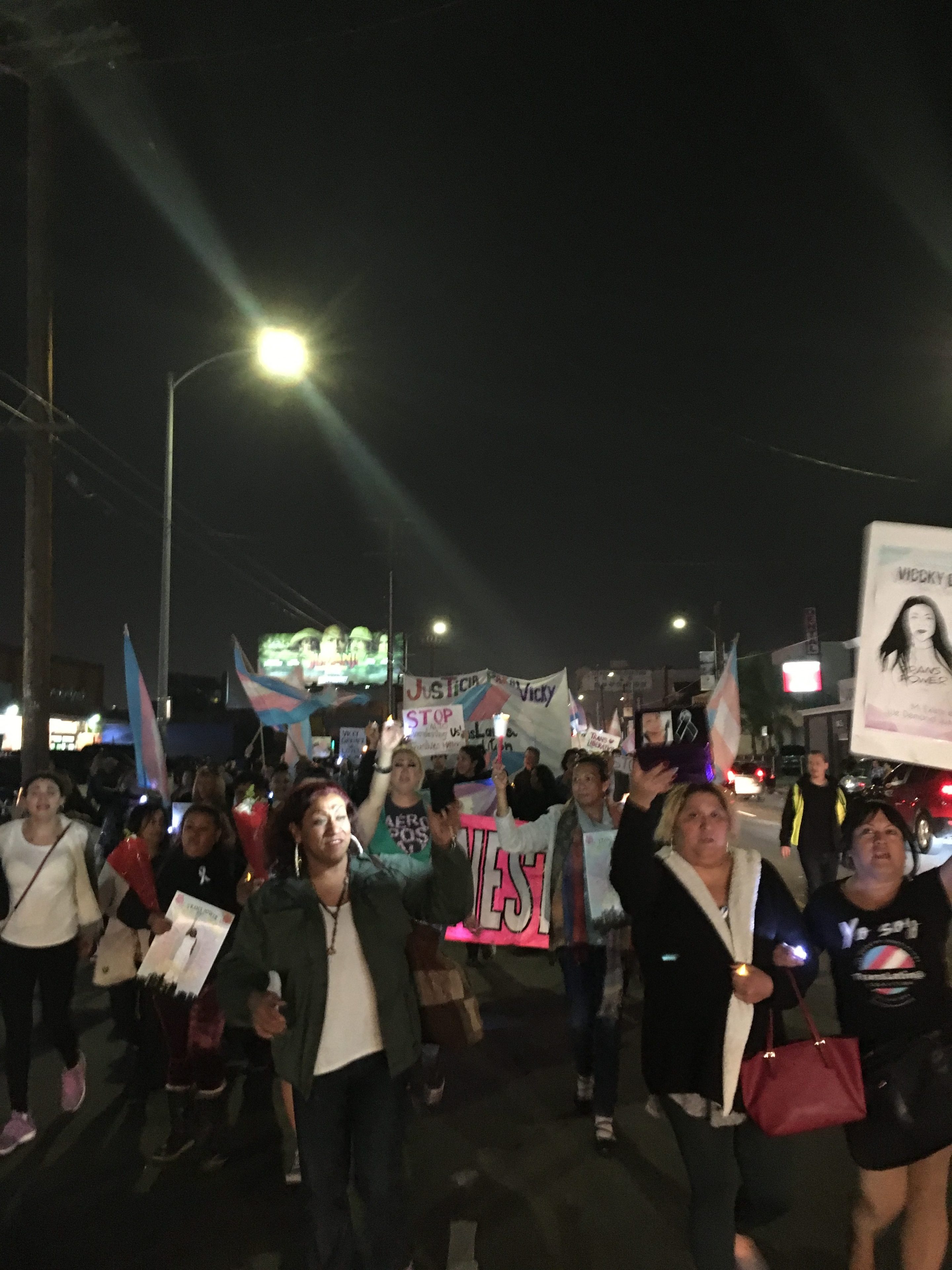Los Angeles homicide detectives have made an arrest in the investigation of a suspicious fire that burned the apartment of a transgender woman in Pico-Union.
Firefighters responded to the blaze in the 1700 block of South New Hampshire Avenue about 3:15 a.m. on Jan. 10. They found heavy flames burning in an apartment on the second floor of a two-story, multi-unit residence.
Once the fire was extinguished, the Los Angeles Fire Department said, firefighters found a body that investigators from the coroner's office identified yesterday as Victoria Ramos Gutierrez. Police officers were responding to a radio call about a fight when the fire department received a call about the house fire at the same address. The police department had said at the time that its investigators were aware that a transgender woman lives at the location of the fire and acknowledged “She has not been located and may be the decedent.”
Local activists were the first to announce that Gutierrez was the victim and that they were certain she was murdered. Bamby Salcedo, president of TransLatin@ Coalition, announced the murder in a Jan. 10 Facebook post:
“It is with deep sadness, rage, and pain that I have to share with all of you that one of our sisters was brutally murdered in #southlosangeles last night.”
The next day members of the LAPD-FBI Fugitive Task Force arrested 29-year-old Kevyn Ramirez, a resident of Los Angeles, for the murder of the then-unidentified victim found in the fire. The LAPD said Ramirez admitted to investigators that he killed Gutierrez after a dispute. He was charged with murder and arson on Jan. 16.
Ramirez had met Gutierrez online, officials from the Los Angeles County District Attorney’s Office said in a news release. He allegedly stabbed Gutierrez during a robbery and set fire to her home.
Salcedo says the police were being cautious about identifying Gutierrez as the victim because her body was burned beyond recognition. “We know it’s her,” Salcedo said in a phone interview yesterday before the victim was identified. “She doesn’t answer the telephone, and we have known that the man they arrested confessed that he killed her. The police asked us who her dentist was because they wanted her dental records to make a comparison.”

Gutierrez, 32, was an immigrant from the small town of Río Lindo, Honduras, who spent the last decade of her life in Los Angeles.
Jacqueline Guillen, an outreach specialist with Translatin@ Coalition who is also from Honduras, says it is not uncommon for trans women from poor countries to emigrate to L.A. seeking safety. “Many of us flee from violence and come here for refuge,” she says. “And yet here we can be killed for the same transphobia. It’s as though we have nowhere safe to go.”
At least 28 transgender people were fatally shot or killed by other violent means in 2017. It was the most killings ever recorded in a year, according to the nonprofit Human Rights Campaign. It surpassed 2016, which had the previous highest number: 23. Nearly every victim last year was a trans person of color. The last trans person murdered in Los Angeles was Yasmin Payn, 33, a black woman stabbed to death by her boyfriend at her Van Nuys apartment in 2015.
The house on South New Hampshire where the arson occurred is in the heart of the Pico-Union/Westlake district of Los Angeles known as Pequeña Centroamérica. Gutierrez lived a quiet life alone among married couples and extended families from countries like Guatemala, El Salvador, and Honduras.
Her neighbors remembered her fondly, using words like “pleasant,” “cheerful,” and sentences like “No se metía con nadie.” She kept to herself. She was always smartly dressed and impeccably groomed when she took her white Bichon Frise for walks in the afternoon. The dog went missing after the fire, and a grandmother who lives in the house next door told me she was heading up the search.

Gutierrez attended peer support groups for Latin American trans women in L.A., including at el Centro del la Prevención para la Violencia y el Bienestar Transgénero, a project of Translatin@ Coalition.
On Jan. 12, the Trans Latin@ Coalition convened an emotional rally it called Viccky's Vigil of Resistance at the corner of Venice and Vermont in Pico-Union to call attention to the murder.
After a brief rally, the candlelit procession of mostly trans women and men moved onto the street and occupied the two westbound lanes of Venice Blvd, stopping traffic for a block between Vermont and New Hampshire avenues. Marchers held up signs (“R.I.P. Sister,” “Trans Power,” etc.), waved Transgender Pride Flags, and led chants in unison (“Todos Somos Viccky!”) powered by a rainbow-colored-LED-lit sound system they carted on a hand truck.
The sounds of the protest echoed around the wide commercial expanse of auto stores, panaderías, cafeterías and artesanías of Little Central America, and brought foot traffic on the sidewalk to a bemused standstill.
Los Angeles police in patrol cars attempted to redirect the march back onto the sidewalk, without success. Participants in the lead were shouting at the top of their lungs and many shed tears as the march neared Gutierrez’s home.

The house is now vacant, the windows at the front are boarded up, and the roof is blackened with soot. What remains of Gutierrez’s ruined belongings lay discarded in a pile beneath tarps on the driveway.
Friends and neighbors have left devotional candles in the front yard, and Gutierrez’s boyfriend, Isaac Salazar, 38, set down an arrangement of red and white roses decorated with photos of them together as a couple.
“Tanta saña,” he said in a low voice. “Tanto odio.”
The crowd filling the street in front of the multi-family home alternated between chants of defiance (“We will never give up!”) and clinging, sobbing embraces. María Román, a leader of the local trans community, said in her remarks that the prompt arrest of a suspect in Gutierrez’s murder was a testament to the work of activists to make trans people more visible in the city.
Ramirez, the suspect, faces a maximum sentence of life in prison without the possibility of parole or the death penalty.
A GoFundMe campaign to cover the expenses of Gutierrez’s funeral service and to have her remains repatriated to Honduras raised more than $12,000.







